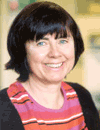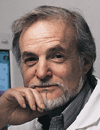08:00 | Registration |
|
Non-coding RNA and Gene Silencing |
| |
09:00 |  | Keynote Presentation Non-Coding RNA and Chromatin Remodeling: Epigenetic Control of Transcription
Ingrid Grummt, Head, German Cancer Research Center, Germany
I will summarize the molecular mechanisms underlying ncRNA-mediated epigenetic gene silencing, while focusing on the role of RNA in targeting chromatin modifying enzymes to regulatory gene sequences. |
|
09:30 | Chromatin Remodeling and Epigenetic Control of Cell Differentiation
Karl Ekwall, Professor of Medical Genetics and Epigenetics, Karolinska Institute, Sweden
The great diversity of epigenomes that can arise from a single genome permits a single, cell to generate all the different cell types of an adult individual. The epigenetic changes include modifications of the DNA and histones, and are a prerequisite for cell differentiation. Maintenance of one particular epigenome during chromatin replication is crucial for clonal expansion of cell lineages and tissues. Our laboratory is studying how chromatin-remodeling factors are contributing to epigenetic control mechanisms. |
10:00 | A Tale of Two (Epigenetic) Switches
Narendra Maheshri, Assistant Professor, Massachusetts Institute of Technology, United States of America
I describe our understanding of the dynamics of two different epigenetic switches in budding yeast and how this relates to whether the epigenetic state is molecularly encoded in cis or trans. |
10:30 | Coffee Break and Networking in the Exhibition Hall |
11:15 | Dynamics of Sex Chromosome Activity During Gametogenesis
Willy Baarends, Group Leader, The Erasmus University Medical Center, Netherlands
During meiotic prophase in male mammals, the heterologous sex chromosomes (X and Y) are transcriptionally silenced by a special process termed meiotic sex chromosome inactivation. I will present our data concerning the initiation, maintenance, and biological relevance of this process. |
11:45 | The TGFbeta Signalling Pathway Rewires the Hierarchy of Chromosome Interactomes
Rolf Ohlsson, Professor, Karolinska Institute, Sweden
Posttranslational modifications regulate macromolecular interactions in cis and in trans to allow rapid adaptation to changing environments. Here we document a new role for one such modification as a mediator of interchromosomal complexes, which are antagonized by TGFbeta signalling. |
12:15 | Lunch and Networking in the Exhibition Hall |
13:15 | Poster Viewing Session |
14:15 |  | Keynote Presentation DNA Methylation and the Cancer Epigenome Biological and Translations Implications
Stephen Baylin, Deputy Director, Johns Hopkins University School of Medicine, United States of America
We are in an exciting period of increased understanding of the molecular origins of epigenetic abnormalities in cancer. The resultant biological insights are increasingly important for developing strategies for “epigenetic therapies” for cancer and biomarker development. |
|
14:45 | The Rogue Peas: An Unforgivably Forgotten Paramutation
Jose Leitao, Professor, Universidade do Algarve, Portugal
The spontaneously appearing rogue phenotype in Pisum sativum L. was the first reported and studied case of the epigenetic phenomenon paramutation. Although over 80 years have passed since the determination of the aberrant, defying the Mendelian rules, inheritance of this phenotype, no research data have been published aiming at to uncover the molecular mechanisms that underlie the establishment, maintenance and inheritance of the rogue traits. |
15:15 | Coffee Break and Networking in the Exhibition Hall |
|
Epigenetic Drug Discovery |
| |
16:00 | Cancer Epigenetics: New Drugs and Paradigms
Frank Lyko, Group Leader, German Cancer Research Center, Germany
Altered DNA methylation plays a major role in cancer development. This presentation will discuss new drugs for the experimental modulation of DNA methylation patterns and also illustrate how the ongoing characterization of cancer epigenomes influences our strategies for epigenetic drug discovery. |
16:30 | Chemotherapy and Epigenetic Therapy: Overlaps and Concerns
Steven Gray, Senior Clinical Scientist, St. James’s Hospital & Trinity College Dublin, Ireland
Epigenetic drugs and chemotherapy can reactivate epigenetically silenced genes with either “good” or “bad” consequences. Candidate epigenetic markers may be a key factor in stratifying patients for therapy and/or predicting response to therapy. |
|
Epigenetic Reprogramming |
| |
17:00 | An ENU mutagenesis screen identifies the first mouse mutants of a novel epigenetic modifier, Rearranged L-Myc Fusion (Rlf).
Sarah Harten, Senior Research Officer, Queensland Institute of Medical Research, Australia
A mutagenesis screen, using mice carrying an epigenetically sensitive GFP reporter was established to identify genes involved in epigenetic reprogramming. So far, over 50 mutant lines have been produced, including both well-known epigenetic genes e.g. Dnmt1 and novel genes e.g.Rlf. |
17:30 | Drinks Reception |


